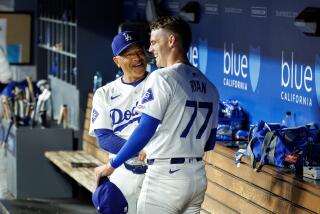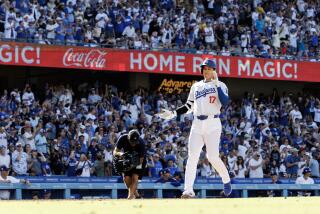Dodger Sale Indicative of Baseball Troubles
Why, you may ask, would anyone want to sell the Los Angeles Dodgers? And what does that proposed sale by Peter O’Malley tell us about baseball?
These days, baseball gets its socks rocked on a regular basis. But Monday’s shocking news -- that O’Malley wants to sell the crown-jewel franchise of the entire sport -- has left the game dizzy and disoriented. When O’Malley jumps in a lifeboat and starts rowing for shore, who’s left on board except the rats?
“Family ownership of sports today is probably a dying breed,” said O’Malley who, since 1970, has run the team that his father Walter controlled since 1950 back in Brooklyn. “If you look at all sports, it’s a high-risk business,” he told reporters Monday. “You need a broader base than an individual family to carry you through the storm. Groups and corporations are probably the wave of the future.”
Owning a big league ballclub in an enormous market such as Los Angeles was one of America’s great businesses for decades. Only the Federal Reserve could print money faster. Estimates of the worth of the Dodgers franchise seem to grow daily. Guesses started at $200 million. Some are up to $500 million.
Now, however, even a plum franchise with a mythic history in a vast city in a gorgeous private ballpark with perfect weather is just a pretty good business. Sometimes. That is, if you don’t have a strike that erases the World Series and knocks down attendance, plus TV ratings, by about 20 percent.
If baseball were still a fabulous business, or offered the prospect of becoming one again in short order, O’Malley would never put his team up for sale. He’s only 59. If enormous profits were knocking on his door -- as they did during almost all of the 39 seasons in Los Angeles in which the Dodgers drew more than 100 million fans -- he could’ve delayed this decision for 10 years.
The fact that he didn’t is a blow to the baseball union’s credibility in its never-ending crusade to convince the public that owners still make lots of money. Now, O’Malley has given baseball’s owners a sword. Every time the union gets on its soapbox, the owners can say, “Your salaries are so high that even O’Malley sold.”
Before we prepare baseball’s obituary and set it in type, we should look at O’Malley’s other motivations for selling -- which may have been at least as important as the game’s currently crummy economics.
The O’Malley family is worried about “estate planning.” As O’Malley put it this week, “It’s a pretty good idea not to have all your eggs in the same basket.”
O’Malley and his sister, who are equal heirs to the team, have 13 children between them. The family doesn’t want to risk the kind of blood-feud fire-sale disaster that attended the distressed disposal of the Miami Dolphins by Joe Robbie’s estate.
O’Malley sees the wisdom of selling now, at a full price, and paying capital gains tax. Besides, if the Dodgers are sold now, everything can be done in a leisurely manner.
Hard as it is to believe, O’Malley is also selling because the city of Los Angeles did not appreciate him. Granted, some sports owners aren’t worth appreciating. But O’Malley was. The family built its own park on its own land and paid tons of taxes over the decades. The Dodgers were responsible corporate citizens who, as much as any institution, gave the raw unpolished L.A. of the late ‘50s a calling card to the rest of the nation.
In the ‘90s, O’Malley had a few grand plans of his own -- kind of like his dad. He wanted a new stadium for the Dodgers. Then, right next door, he wanted to build another stadium and buy an NFL team to put inside it. All of a sudden, Los Angeles looked at him funny. Instead of seeing conservative, respectable Peter O’Malley, they acted like they were dealing with cigar-smoking, poker-playing, wheeling-and-dealing Walter O’Malley.
Why, L.A. dealt with the Dodgers with both hands over its wallet. No new Dodger Stadium. Worse, the city insisted that its top priority was getting an NFL tenant for its Coliseum -- a facility slightly newer than its namesake.
The conservative, respectable O’Malley demurred. This week, he said, “We have to let the Coliseum play out its course.”
But “we” don’t have to like it.
Now, suddenly, everybody in Los Angeles is realizing the civic treasure, of a sort, that they had in the Dodgers. Why, at Chavez Ravine the ushers wore straw hats and a smile. Within a few years -- just watch -- the legends will grow about the O’Malley’s “Kill ‘em With Kindness” philosophy of doing business. If a speck of dirt appeared on your seat, it was removed with a pair of tweezers. If a cloud crossed the sun or smog obscured the San Gabriel Mountains for an inning, you got two rain checks -- one for you and one on general principles.
Life in Dodgerland wasn’t quite this pristine under O’Malley. But it was close. To some tastes, the Dodgers were almost comical with their baseball version of ancestor worship and talk about The Big Dodger in the Sky. But the public appreciated a dependable, first-class family entertainment. And the O’Malley product is already being missed.
Baseball will lose a fine owner on the day O’Malley sells. But, even sadder, is the opportunity O’Malley himself wasted over the past few years of crisis. Had he fought for his entire sport, not just his team, baseball might still be in such fine health that no O’Malley would ever dream of selling.
More to Read
Go beyond the scoreboard
Get the latest on L.A.'s teams in the daily Sports Report newsletter.
You may occasionally receive promotional content from the Los Angeles Times.










